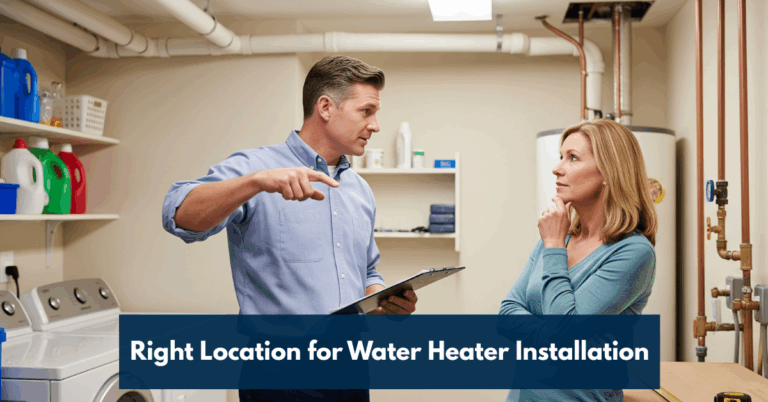When it comes to Water Heater Installation, one of the most important decisions homeowners often overlook is the location. Choosing the right spot for your water heater affects not only efficiency and safety but also the overall convenience in your daily life. Whether you live in Michigan or Florida, your home layout, climate, and building codes play a major role in selecting the ideal placement. At Whitney Services, we specialize in helping homeowners make smart decisions about water heater installation, ensuring long-lasting performance and comfort.
In this article, we’ll guide you through the critical factors to consider when selecting the best location for your water heater and explain why professional help is the smartest choice.
Why Location Matters in Water Heater Installation
The location of your water heater has a direct impact on:
- Efficiency – A properly placed water heater reduces heat loss and energy waste.
- Safety – Poor placement can increase the risk of leaks, flooding, or fire hazards.
- Convenience – Easy access for maintenance and repairs saves time and money.
- Code Compliance – Local building codes in Michigan and Florida regulate where and how water heaters can be installed.
By working with experts like Whitney Services, you’ll ensure your system is installed correctly and in the most efficient location possible.
Factors to Consider When Choosing a Water Heater Location
1. Proximity to Plumbing Fixtures
Ideally, your water heater should be located close to the areas of highest demand such as bathrooms, kitchens, and laundry rooms. This reduces the time hot water takes to reach faucets and minimizes energy waste.
2. Space and Accessibility
Your water heater should be installed in a space large enough for ventilation and future maintenance. There must be enough clearance for a technician to service or replace parts. Tight or hidden spaces can make repairs costly and complicated.
3. Ventilation and Airflow
Gas water heaters require proper ventilation to remove harmful gases like carbon monoxide. Electric water heaters also need adequate airflow to prevent overheating. Attics, garages, and basements are common installation areas, but each must meet ventilation requirements.
4. Drainage Considerations
Leaks or overflows are always possible. Installing your water heater in a place with floor drains—or adding a drain pan—protects your home from water damage.
5. Building Codes and Regulations
Michigan and Florida each have specific codes for water heater installation. For example, some regions require water heaters to be strapped down for safety, especially in areas prone to flooding or hurricanes. A professional from Whitney Services will ensure your installation meets all local requirements.
6. Energy Efficiency
Where you install your water heater can affect how efficiently it runs. For example, placing it in an uninsulated garage in Michigan may lead to heat loss, while installing it in an air-conditioned space in Florida may increase energy use. Location matters more than you might think.
7. Future Expansion
If you plan to add more bathrooms or upgrade your appliances, choose a location that allows for an upgraded system later. Planning ahead can save money in the long run.
Best Places to Install a Water Heater
While every home is different, here are the most common and practical locations for Water Heater Installation:
- Garage – A popular choice, offering easy access, ventilation, and room for drainage.
- Basement – Ideal in colder Michigan homes, though insulation may be needed.
- Attic – Common in Florida homes, but requires careful attention to drainage and weight support.
- Utility Room or Closet – Works well if ventilation and clearance requirements are met.
Common Mistakes Homeowners Make
- Installing in a Hard-to-Reach Area – Makes future maintenance difficult.
- Ignoring Drainage Needs – Can lead to costly water damage.
- Overlooking Ventilation – Creates dangerous carbon monoxide risks for gas models.
- DIY Installations – Attempting installation without professional help can lead to safety hazards, code violations, and reduced efficiency.
Why Choose Whitney Services for Water Heater Installation
At Whitney Services, we take the guesswork out of choosing the right location for your water heater. Our licensed technicians assess your home layout, energy needs, and safety requirements before recommending the best spot. Whether you’re upgrading to a tankless model or replacing an old water heater, we guarantee professional, code-compliant installation that ensures efficiency and peace of mind.
Homeowners in Michigan and Florida trust Whitney Services because:
- We provide expert guidance tailored to your home.
- We ensure code-compliant installations.
- We offer fast, reliable service at competitive prices.
- We focus on long-term performance and safety.
Final Thoughts
Choosing the right location for Water Heater Installation is not just about convenience—it’s about efficiency, safety, and long-term savings. From proper ventilation to drainage and building code compliance, every detail matters. By partnering with Whitney Services, you get expert guidance and professional installation that ensures your water heater performs at its best for years to come.
If you’re in Michigan or Florida and need reliable water heater installation, Whitney Services is your trusted choice. Contact us today to schedule your service and enjoy peace of mind knowing your home comfort is in the right hands.
Frequently Asked Questions
The best location depends on your home’s layout. Garages, basements, and utility rooms are common choices, but placement should always balance convenience, efficiency, and safety.
Yes, but it requires proper drainage and structural support. Attic installations are more common in warmer climates like Florida.
In some cases, yes—especially gas water heaters in garages. Local building codes often require them to be elevated to prevent fire hazards.
Most manufacturers recommend at least 2–3 inches of clearance for airflow and maintenance access.
DIY installation is not recommended. Improper installation can void warranties, create safety risks, and violate local building codes. Always hire a professional like Whitney Services.






